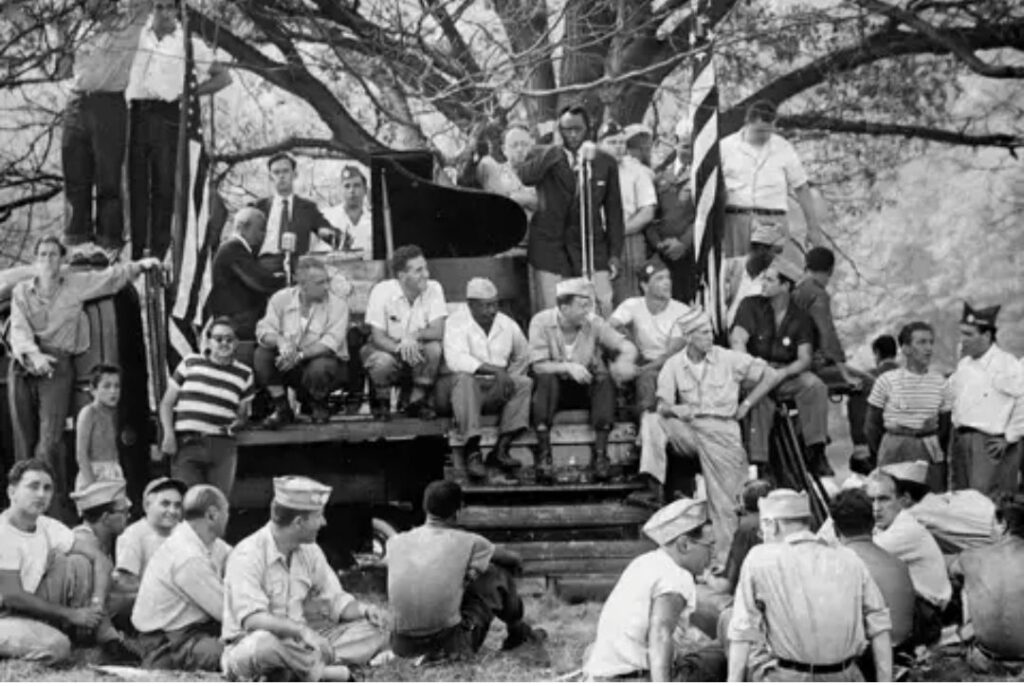If you’re looking to be inspired and learn more about who Paul Robeson was and the history of the Peekskill Riots, save these two dates on your calendar: 9/12/24 and 9/15/24. To commemorate the 75th anniversary of the Peekskill Riots, there’ll be two captivating performances by Grammy Award winner Mark S. Doss, entitled “Here I Stand” – after the seminal book of the same title written by Paul Robeson years after the riots.
In 1949, Peekskill, New York, became the unexpected epicenter of a turbulent chapter in American history. The world-famous African-American, singer, artist, and civil rights activist Paul Robeson was scheduled to perform a concert in the area. The concert, set for August 27 at Lakeland Acres near Peekskill, turned violent as a local mob attacked concert-goers with rocks and baseball bats before Paul Robeson even arrived. Despite the chaos, local police arrived hours later and provided minimal intervention. Thirteen people suffered serious injuries, Robeson was lynched in effigy, and a burning cross was visible on a nearby hillside.
Paul Robeson was not a man to be silenced; six days later, he returned to perform in Peekskill, drawing a crowd of 20,000 attendees. Despite the presence of anti-Robeson protestors outside the venue, the concert proceeded as planned. Although Robeson performed without incident, the aftermath of the concert was far from peaceful. Fueled by racist, anti-Semitic, and anti-Communist sentiments, protesters attacked concertgoers, many of whom were African American and Jewish. 150 people were injured in the violence, many of them seriously.
Within a few days, hundreds of editorials and letters appeared in newspapers across the nation and abroad by prominent individuals, organizations, trade unions, churches, and others. They condemned the attacks and the failure of the police to protect the concert-goers. Despite these condemnations, the mainstream press and local officials overwhelmingly blamed Robeson and his fans for “provoking” the violence.
Over the years, the so-called Peekskill Riots have gradually faded from memory, especially in Peekskill itself, where there are no signs, plaques, or monuments commemorating this important historical event. Robeson’s iconic legacy has also been obscured from history. In 1950, the State Department revoked his passport, preventing him from traveling abroad to perform, which severely limited his career opportunities. Domestically, he was blacklisted, resulting in the cancellation of his concerts and the refusal of venues to book him. Additionally, the FBI and other government agencies kept him under constant surveillance and pressured organizations to dissociate from him. In 1958, he had his passport returned after the U.S. Supreme Court ruled that the State Department could not deny citizens the right to travel based on their political beliefs. However, for Robeson, this ruling came too late. The systematic campaign of repression, coupled with widespread media smear tactics, marginalized and silenced one of the greatest artists of the 20th century and a trailblazer in the American Civil Rights Movement.
This year marks the 75th anniversary of the Peekskill Riots. That’s why several residents of Peekskill and its surrounding areas have joined forces in the Robeson in Peekskill Project, a grassroots initiative that aims to commemorate and highlight the Peekskill Riots, not only as a painful yet significant chapter in Peekskill’s history but also as a reminder that freedom of expression is a fundamental right of every American citizen. Committee chair Wendy Tialo: “Paul Robeson is a towering figure in American history. He was an All-American football star and graduated as the valedictorian from Rutgers University, where he was the only African-American student on campus and the third to enroll. Robeson was also the first Black actor to play Othello on Broadway and to take on a lead role in the film. As the highest-paid entertainer of his time, he was a globally celebrated bass-baritone who performed musical theater and operatic repertoire in 26 languages. At one point, Time magazine named him the most famous African American in the world. This alone is reason enough to honor his iconic artistic legacy. Additionally, the Peekskill Riots were a momentous event that shook the nation and are seen by many as the beginning of the American Civil Rights movement. We hope that the Robeson in Peekskill Project will foster a deeper appreciation of Robeson’s impact and inspire future generations to stand up for justice and equality.”
On Thursday, September 12, the Robeson in Peekskill Project will host the Robeson in Peekskill Gala Dinner at the Hollow Brook Golf Club in Cortlandt Manor, NY, the very site where Paul Robeson’s first concert was scheduled to take place in 1949. This event marks the first time an occasion honoring Paul Robeson will be held at this location. This fundraiser will feature a concert by Grammy Award-winning bass-bariton Mark S. Doss and Pegasus: the Orchestra. Doss will perform “Here I Stand,” a mesmerizing tribute to Paul Robeson that showcases the wide range of spirituals, folk songs, and classical masterpieces linked to Robeson’s rise to stardom. On Sunday, September 15, Mark S. Doss will return to Peekskill to perform “Here I Stand” once again, this time at a community concert held at the Paramount Hudson Valley Theater in Peekskill.
For more information about the events and to purchase your tickets, please visit https://www.robeson-in-peekskill.org/75th-anniversary-events











